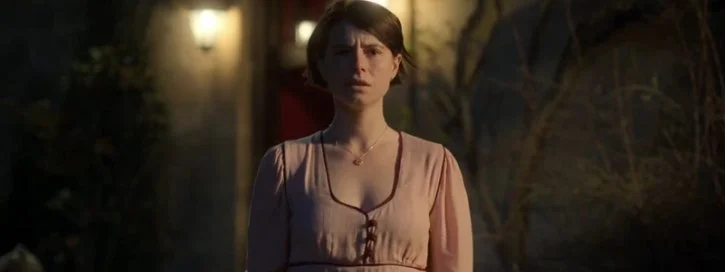Alex Garland is a filmmaker that no doubt wants to provoke a reaction out of his audience. In “Ex Machina” he predicted A.I. would slowly sneak into society and take over, and in “Anihillation” he climaxed his horror film with a mind-boggling lightshow reminiscent of ‘2001.’ His latest film, titled “Men,” is his most polarizing creation to date.
It’s obvious, just by the title alone, that Garland tackles some form of “toxic masculinity” in “Men” (the writer-director’s films have never really been known for their subtleties). Its main protagonist (Jessie Buckley), after the suicide of her abusive partner, decides to retreat alone to the beautiful English countryside, hoping to find a place to heal.
Instead of peace and tranquility, what she finds instead is a barrage of inconsiderate men, some of whom, she believes may be stalking her. Is she losing her mind? What begins as simmering dread soon becomes a fully formed nightmare, dark thoughts and visions start to creep into the mix.
The more “Men” goes along, the more ambiguous it becomes. Horror and sci-fi elements start being thrown into the mix, you’d even think we’ve stumbled into a David Cronenberg movie. However, this is very much folk-horror, a tale all-encompassed by its rural setting and a need to interject religious and nature-based metaphors.
Garland’s vision here is singular, it’s an undefinable movie and just for that I’ll recommend “Men.” You either go along with the atmosphere Garland’s created here or you don’t. I wasn’t fully onboard for the 110 minute runtime, but my attention rarely wandered.
If anything, “Men” really picks up in its last half hour or so, that’s when Garland decides to go full-on abstract and insert beguiling body-horror to his narrative. It helps that Jessie Buckley is absolute aces here. Playing a victim of male abuse (both physical and psychological), this must have been a tough character for Buckley to crack, as she is always in a near-constant state of emotional duress.
Garland’s message is also sadly hammered down our throats: “THE BAD THINGS MEN CAN DO TO WOMEN. His intentions in making this film don’t come out full-formed either, especially with his outright refusal to answer any of the film’s lingering mysteries. Garland so desperately wants to sneak into the viewers brain, but we end up in a state of confusion rather than enlightenment. He tries hard to bewilder, maybe a little too much so. [B]






